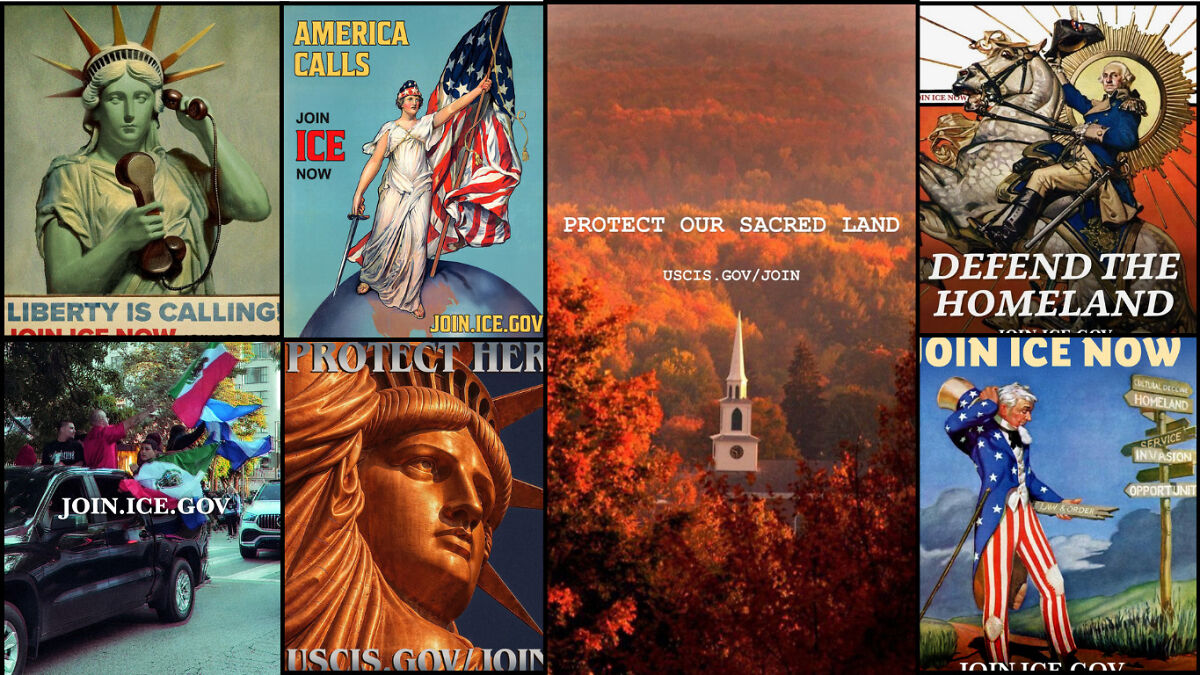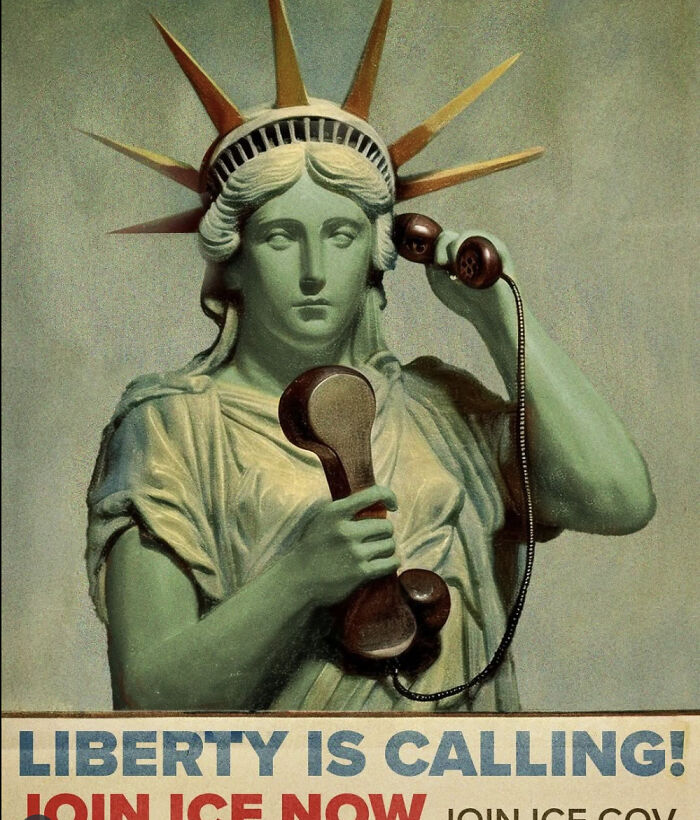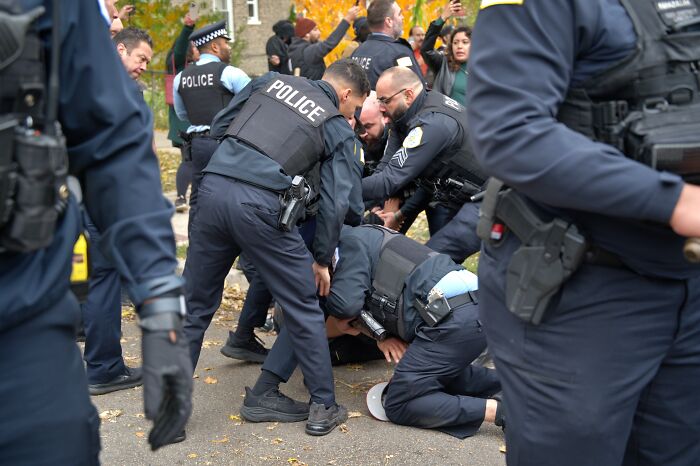ICE is spending millions to convince Americans that joining its ranks is not just a job but a calling to defend a collapsing America.
The ads are everywhere, from local news and television in big cities to online platforms like Hulu, YouTube pre-rolls, Spotify ads, Meta platforms, and social media.
The message is blunt: only real defenders of the nation sign up for ICE.
- ICE has spent over $6.5 million since September on a nationwide campaign to recruit 10,000 deportation officers by year-end.
- The ads use WWII-style nostalgia and portray immigrants as invading forces threatening a 'pure' American past.
- Campaign imagery appeals to hypermasculinity, targeting young, patriotic men with messages of strength and protection.
ICE is spending millions on ads to convince Americans to join its ranks
Image credits: U.S. Immigration and Customs Enforcement/Getty Images
“You took an oath to protect and serve,” a narrator says over images of American cities and agents in tactical gear. “But in sanctuary cities, you’re ordered to stand down while dangerous illegals walk free.”
The ads are part of a sweeping and expensive campaign to help President Donald Trump meet his promise of mass deportations.
According to advertising data reviewed by the Associated Press, ICE has spent more than $6.5 million since mid-September to attract thousands of new officers.
The goal is to hire 10,000 deportation officers by the end of the year, backed by a funding package of at least $30 billion—a 10-fold increase under Trump’s administration for ICE.
Image credits: DHS/X
The advertisements are carefully crafted to convey specific messages.
We analyze those themes.
ICE can bring back the pure and simple America
One of the most consistent visual motifs running through ICE’s campaign is nostalgia.
The posters and videos look like they were AI-generated by typing “WWII propaganda poster” and remaking them to fit ICE’s mission. Everything is washed in a ruddy retro color palette. Uncle Sam appears constantly, sometimes stern, sometimes dazed.
But the nostalgia is oddly specific: the ads yearn for the millennial childhood.
View this post on Instagram
A widely circulated image shows white children playing with a ball on a lawn in front of a classic suburban house. Set against a backdrop of autumn trees, the scene evokes an idealized vision of the American Dream.
The image is a painting by artist Andy Thomas, captioned, “The Homeland we seek to defend.”
Another image features a still of a 1992 Apache helicopter flyover at a NASCAR race, paired with the command to “recapture our national identity.”
Julio Anta, a graphic novelist, told NPRthat the World War II themes are a call to arms, “trying to inspire this newer generation to see this fight against immigrants as something in line with the greatest generation [who fought in the second World War II].”
“This is all about a time when society was great for white people, and trying to bring it back to that time again,” Anta added.
America is being invaded
If nostalgia is the hook, fear is the plot. If one were to view the posters without any context, one would think America is at war with immigrants.
In ICE’s story, something terrible has happened since those childhood days: America is under siege. Flyers warn of “cultural decline.” Videos insist the nation is being “invaded.”
The American people gave us a mandate to rid our country of foreign invaders.
Fulfill the mandate. https://t.co/nZkBEj4evQpic.twitter.com/lAY3z1e9OF
— Homeland Security (@DHSgov) October 6, 2025
And the ads call out to you to “Defend the homeland.”
The invaders are never coyly implied, either. They are presented with brown men in turbans or Latinos waving flags, captioned, “Gotta Catch ‘Em All,” or “Keep Criminal Illegal Aliens Out.”
The ads run on motifs of nostalgia and the fear of losing the American culture
Keep Criminal Illegal Aliens Out.
If you want to decide who will enter our country, then join us at https://t.co/YKxVHWPzlf. pic.twitter.com/ySmVOklHYH
— Homeland Security (@DHSgov) October 8, 2025
One widely circulated graphic shows a disheveled Uncle Sam at a crossroads labeled “Homeland,” with “Opportunities” on one side and “Invasion” and “Cultural decline” on the other.
The term “cultural decline” is one of the far-right buzzwords, alluding that immigrants entering America will dilute the nation’s culture.
Image credits: DHS/Instagram
These ads also place Western civilization on a literal pedestal. One poster shows America personified as an Athena-like warrior goddess, wrapped in Grecian robes, captioned, “America calls, Join ICE now.”
Another features a New England church steeple over the line, “Protect our sacred land. Decide who will enter our country.”
A third post depicts John Gast’s 1872 painting, “American Progress,” which shows an idealized female figure, Columbia, who leads settlers and brings in civilization.
View this post on Instagram
“A heritage to be proud of. A homeland worth defending,” the post says.
Real men join ICE
The campaign also leans heavily on a hypermasculine appeal. Reports show that there’s been an increase in Republicans’ support for traditional notions of masculinity and gender roles.
To add to it are the increasingly popular conservative internet personalities who push conventional ideas of masculinity.
The ICE ads play into this idea, featuring posters of supermasculine men positioned as protectors of America.
“Communist?”
DENIED.
“Terrorist?”
DENIED.
“Globalist?”
DENIED. pic.twitter.com/oPcyulhkqd
— Homeland Security (@DHSgov) October 1, 2025
In one ad, a shirtless man with a chiseled chest smiles while the caption says, “Communist? DENIED. Terrorist? DENIED. Globalist? DENIED.”
Another ad shows a shirtless man from the back as he flexes his arms, titled “Protect the West.”
The ads also tap into the idea of ultra-masculine men protecting the country
View this post on Instagram
The target demographic could not be clearer: young, patriotic men who long to feel powerful.
Arrest people you don’t like
In September, The Washington Post interviewed potential ICE candidates, shining a light on some of their intentions.
“I keep seeing these memes where Indians are bragging about taking our tech jobs,” a 36-year-old candidate said. “So I said, ‘Oh yeah? Well I’m going to work with these guys that are going to arrest you, slam your face on the pavement and send you home.’”
Many ICE advertisements bank on these exact sentiments of getting revenge on or being able to arrest people they don’t like. But this does not just extend to immigrants; it also stands true for liberal protestors.
FAFO.
We will NOT allow violent activist to lay hands on our law enforcement. pic.twitter.com/cx5thB7Lcj
— Homeland Security (@DHSgov) October 6, 2025
Many show videos of protestors against ICE, with one post showing them being handcuffed, saying, “FAFO [f**k around and find out]. We will NOT allow violent activist to lay hands on our law enforcement.” Another similar image says, “Lock in, Patriot. It’s the weekend.”
A Department of Homeland Security (DHS) video montage shows clips from raids as federal agents break into houses and show the backs of handcuffed people.
The video is set to the Pokémon theme song and includes footage of the protagonist, Ash Ketchum. “Gotta catch ’em all,” it is captioned.
Gotta Catch ‘Em All. pic.twitter.com/qCvflkJGmB
— Homeland Security (@DHSgov) September 22, 2025
ICE’s ads began appearing in September across major cities, including Albuquerque, New Mexico, Boston, Chicago, Denver, New York, Philadelphia, Sacramento, California, Seattle, and Washington, D.C.
They later expanded to Atlanta, Dallas, El Paso, Texas, Miami, Salt Lake City, and San Antonio.
According to Equis, DHS has spent $2.8 million on Meta to reach both English- and Spanish-speaking audiences. The DHS spent nearly $3 million on Google and YouTube, aimed at only Spanish-speaking people, to promote self-deportation.
Image credits: DHS
While thousands of federal workers went without pay during the latest government shutdown, ad spending for ICE and DHS only increased.
ICE promises signing bonuses of up to $50,000, student loan repayment, and fast career advancement, among other perks. The agency says more than 150,000 people have applied, and 18,000 job offers have been extended.
But, behind the recruitment drive is a concern that rapid hiring could fuel misconduct.
DHS has spent $2.8 million to market these ads through Meta
Image credits: Jacek Boczarski/Getty Images
It is not a first for ICE, after a similar recruitment surge in the 2000s had seen several Border Patrol agents arrested for crimes ranging from cartel cooperation to murder.
As ICE speeds up hiring, the DHS has shortened training from 13 weeks to eight and expanded age eligibility to include people as young as 18.
Poll Question
Thanks! Check out the results:
I was just thinking that there were a lot of similar Cold War Communist propaganda posters that these reminded me of.
Load More Replies...How absolutely DAFUQ dare these bigoted imbeciles use Lady Liberty in their messaging? "Give me your tired, your poor, your huddled masses yearning to breathe free, the wretched refuse of your teeming shore. Send these, the homeless, tempest-tossed, to me; I lift my lamp beside the golden door!' Traitors, imbeciles, and cowards, the lot of you. You aren't America and I reject you fully. If you had souls, you'd be d****d.
Most of it looks like AI slop. The US Government is paying $220 MILLION for this garbage.
I was just thinking that there were a lot of similar Cold War Communist propaganda posters that these reminded me of.
Load More Replies...How absolutely DAFUQ dare these bigoted imbeciles use Lady Liberty in their messaging? "Give me your tired, your poor, your huddled masses yearning to breathe free, the wretched refuse of your teeming shore. Send these, the homeless, tempest-tossed, to me; I lift my lamp beside the golden door!' Traitors, imbeciles, and cowards, the lot of you. You aren't America and I reject you fully. If you had souls, you'd be d****d.
Most of it looks like AI slop. The US Government is paying $220 MILLION for this garbage.











16
5